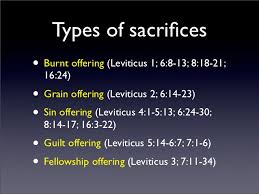|
BACKGROUND
DEFINITION OF TERMS
MELCHIZEDEK
MELCHIZEDEK
PRIEST
PRIESTS AND LEVITES
I. The biblical data
II. Wellhausen’s reconstruction
III. Some reactions to Wellhausen’s reconstruction
IV. Priesthood in the New Testament
The
full background to this teaching is available online at this link
DEFINITIONS - For serious students
|
Online links to scriptures (New International Version [NIV] unless otherwise stated) are shown in blue
| THE PRIESTHOOD OF AARON |
|
 With the growth into a nation, a new type of priesthood was required. Gone were the simple family relationships. Now the priesthood had to minister to millions of people.
As a written language had been acquired from the Egyptians, information that had formally had to be passed down orally from generation to generation could now be recorded in written form. Hence the capacity now existed for the people to record large amounts of information.
|
| THE LAW |
|
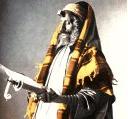 In the perfect timing of God the situation now existed for a new priesthood, one based on recorded law that could be available and understood by a large number of people. Of course, because it was in written form, God could lay out in much greater detail the way in which He desired His people to live.
I am advised that “according to the Talmud there are 613 mitzvoth ("commandments") in the Torah. There are 248 positive mitzvoth and 365 negative mitzvoth given supplemented by seven mitzvoth legislated by the rabbis of antiquity.”
Obviously, these would not have been possible to memorise – with my memory anyway!
The Old Testament law was given to Moses on Mt Sinai by God himself, after the people had escaped from Egypt.
|
|
|
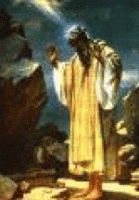 The Law comprehensively covered all aspects of daily living as well as setting out the way in which God desired to relate to His people. God explained this to Moses.
Exodus 19:3-6
|
|
|
The people agreed (temporarily as it turned out!) to abide by the Law.
Exodus 19:7-8
|
|
|
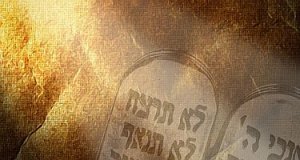 Moses was given the universal laws of the Ten Commandments and rules for daily living, including instruction about Idols and Altars, Hebrew Servants, Personal Injuries, Protection of Property, Social Responsibility, Laws of Justice and Mercy, Sabbath Laws and instructions for The Three Annual Festivals and the construction of the Tabernacle.
|
| THE SEPARATION OF KINGS AND PRIESTS |
|
 One important feature of the creation of the Jewish nation was the separation of the temporal ‘kingly’ functions from the spiritual, ‘priestly’ ones.
However, in spite of this separation, there was a much closer relationship between the two than, for instance, we would see today.
Of course, this relationship depended, to a large extent, upon the attitude of the king towards God. The story of the Jewish nation is recorded in Kings and each succeeding king is first described by his attitude towards God, as that set the pattern for his reign. There were godly kings such as Hezekiah
2 Kings 18:1-3
|
|
|
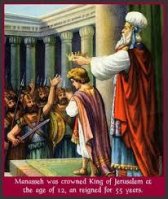 to go along with the ungodly, such as Hezekiah’s son, Manasseh.
2 Kings 21:1-2
|
|
|
The ups and downs of the history of people of Israel were largely determined by the attitude of their individual kings to God.
|
| THE ROLE OF THE PRIESTHOOD |
|
 The Biblical definition of a priest is:
"A chosen officer or prince with the capacity to draw near to God and minister. He alone is responsible for offering the divinely appointed sacrifices to God, for executing the different procedures and ceremonies relating to the worship of God, and for being a representative between God and man." (http://www.bible-history.com/tabernacle/TAB4The_Priests.htm)
A priest is an intermediary between man and God offering God’s blessings in return for sacrifice for man’s sin.
Sacrifice of a life for a life, is a basic principle of God. Why? We don’t really understand but it doesn’t alter the fact that all sin requires a blood sacrifice;
Leviticus 17:11
|
|
|
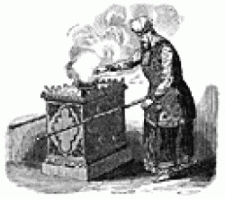 While we don’t know the form of the sacrifice that Melchizedek offered to God, there would have been one. With the Aaronic priesthood however, the sacrifices were very clearly set out in the instructions Moses received from God. For example;
Leviticus 6:8-13
|
|
|
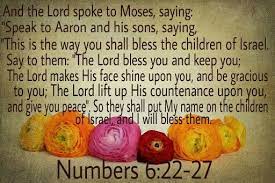 Accompanying the sacrifices, as a sign of sin forgiven, was the blessing;
Numbers 26:22-7
|
| NEXT WEEK: A REVELATION OF....... THE 3 PRIESTHOODS continues..... |
|
 .... as we progress through our study of the Aaronic Priesthood.
|
| A NOTE FROM DAVID |
|
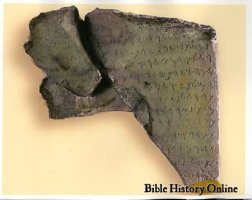 The priesthood of Aaron is a natural example of what we are to do today in the spiritual. Physical sacrifices are no longer required but spiritual sacrifice certainly is. We will see how this theme develops as we proceed.
BIBLE ARCHAEOLOGY
Tel Dan Stele
Was the house and kingdom of David a Biblical myth or did they really exist?
An inscription containing the words "house of David" was found on a black basalt stone slab called the Tel Dan Stele, from Tel Dan, Israel, 9th Century B.C.
The "House of David" is inscribed on this victory stele excavated at Tel Dan, in the Galilee region of Israel. It is dated from the 9th Century BC. The Israel Museum, Jerusalem. The Tel Dan Stele is important in the study of Biblical Archaeology, it mentions the House of David in an Inscription. With this important discovery it is clear that King David is a real figure in ancient history, as Jesus confirmed.
1 Kings 8:16 - "Since the day that I brought forth my people Israel out of Egypt, I chose no city out of all the tribes of Israel to build an house, that my name might be therein; but I chose David to be over my people Israel."
1 Kings 2:11 - "And the days that David reigned over Israel were forty years: seven years reigned he in Hebron, and thirty and three years reigned he in Jerusalem."
Material - Basalt Stone Stele
Israel Period of the Kings
Date: 858-824 BC
Language: Aramaic
Height: 32 cm
Width: 22 cm
Depth:
Tel Dan, Galilee
Excavated by: Avraham Biran 1994
Location: Israel Museum, Jerusalem
Source: http://www.bible-history.com
|
So until next week.......
MAY GOD BLESS YOU AND YOU BLESS GOD!
His servant and yours

Learn more about us at...
www.wwj.org.nz/about.php
|
A DAVID'S DOODLING
947. The Old Testament signposts the path, the New is the path.
David Tait
|
Check
out the WWJ website for….
More David's Doodlings: www.wwj.org.nz/dd.php
Waxing Lyrical: http://www.wwj.org.nz/waxing.php
If Only I'd Thought of it: http://www.wwj.org.nz/thought.php
Laughing at Ourselves: http://www.wwj.org.nz/laugh.php
A look at some of lifes curious questions: http://www.wwj.org.nz/why.php
|









